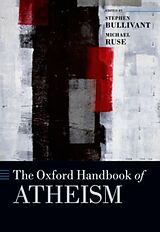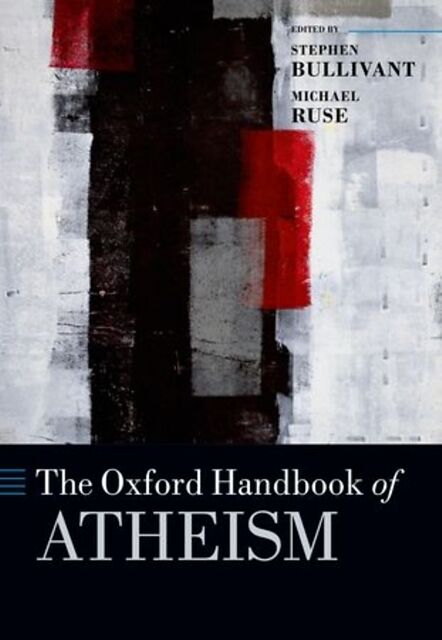The Oxford Handbook of Atheism
Einband:
Fester Einband
EAN:
9780199644650
Untertitel:
Englisch
Genre:
Philosophie & Religion
Autor:
Stephen (Lecturer in Theology and Ethic Bullivant
Herausgeber:
Oxford Academic
Anzahl Seiten:
784
Erscheinungsdatum:
21.11.2013
ISBN:
978-0-19-964465-0
This handbook is a pioneering edited volume, exploring atheism - understood in the broad sense of 'an absence of belief in the existence of a God or gods' - in its historical and contemporary expressions. It probes the varied manifestations and implications of unbelief from an array of disciplinary perspectives and in a range of global contexts.
Zusatztext The Oxford Handbook of Atheism is an essential resource. No library should be without it. Informationen zum Autor Stephen Bullivant is Senior Lecturer in Theology and Ethics, St Mary's University College. Michael Ruse is Lucyle T. Werkmeister Professor of Philosophy and Director of the Program in the History and Philosophy of Science, Florida State University. Klappentext This handbook is a pioneering edited volume, exploring atheism - understood in the broad sense of 'an absence of belief in the existence of a God or gods' - in its historical and contemporary expressions. It probes the varied manifestations and implications of unbelief from an array of disciplinary perspectives and in a range of global contexts. Zusammenfassung Recent books by, among others, Sam Harris, Richard Dawkins, and Christopher Hitchens have thrust atheism firmly into the popular, media, and academic spotlight. This so-called New Atheism is arguably the most striking development in western socio-religious culture of the past decade or more. As such, it has spurred fertile (and often heated) discussions both within, and between, a diverse range of disciplines. Yet atheism, and the New Atheism, are by no means co-extensive. Interesting though it indeed is, the New Atheism is a single, historically and culturally specific manifestation of positive atheism (the belief that there is/are no God/s), which is itself but one form of a far deeper, broader, and more significant global phenomenon.The Oxford Handbook of Atheism is a pioneering edited volume, exploring atheism - understood in the broad sense of 'an absence of belief in the existence of a God or gods' - in all the richness and diversity of its historical and contemporary expressions. Bringing together an international team of established and emerging scholars, it probes the varied manifestations and implications of unbelief from an array of disciplinary perspectives (philosophy, history, sociology, anthropology, demography, psychology, natural sciences, gender and sexuality studies, literary criticism, film studies, musicology) and in a range of global contexts (Western Europe, North America, post-communist Europe, the Islamic world, Japan, India). Both surveying and synthesizing previous work, and presenting the major fruits of innovative recent research, the handbook is set to be a landmark text for the study of atheism. Inhaltsverzeichnis Introduction: The Study of Atheism 1: Definitions and Debates 1: Stephen Bullivant: Defining Atheism 2: T. J. Mawson: The Case against Atheism 3: A. C. Grayling: Critiques of Theistic Arguments 4: Graham Oppy: Arguments for Atheism 5: Michael L. Peterson: Problems of Evil 6: Erik J. Wielenberg: Atheism and Morality 7: Kimberly A. Blessing: Atheism and the Meaningfulness of Life 8: Brian Davies: Aquinas and Atheism 2: History of (Western) Atheism 9: David Sedley: The Pre-Socratics to the Hellenistic Age 10: Mark Edwards: The First Millennium 11: Dorothea Weltecke: The Medieval Period 12: Denis Robichaud: Renaissance and Reformation 13: Alan Charles Kors: The Age of Enlightenment 14: David Nash: The (Long) Nineteenth Century 15: Callum Brown: The Twentieth Century 16: Thomas Zenk: New Atheism 3: Worldviews and Systems 17: Stephen Law: Humanism 18: Alison Stone: Existentialism 19: Peter Thompson: Marxism 20: Charles Pigden: Analytic Philosophy 21: Jacques Berlinerblau: Jewish Atheism 22: Andrew Skilton: Buddhism 23: Anne Vallely: Jainism 24: Jessica Frazier: Hinduism 4: Atheism and the Natural Sciences 25: Michael Ruse: Naturalism and the Scientific Method 26: Taner Edis: Atheism and the Rise of Science 27: David P. Barash: Atheism and Darwinism 28: Victor J. Stenger: Atheism and the Physical Sciences 5: Atheism and the Social Sciences 29: Frank L. Pasquale and Barry A. Kosmin: Atheism and the Seculariza...
The Oxford Handbook of Atheism is an essential resource. No library should be without it.
Autorentext
Stephen Bullivant is Senior Lecturer in Theology and Ethics, St Mary's University College. Michael Ruse is Lucyle T. Werkmeister Professor of Philosophy and Director of the Program in the History and Philosophy of Science, Florida State University.
Zusammenfassung
Recent books by, among others, Sam Harris, Richard Dawkins, and Christopher Hitchens have thrust atheism firmly into the popular, media, and academic spotlight. This so-called New Atheism is arguably the most striking development in western socio-religious culture of the past decade or more. As such, it has spurred fertile (and often heated) discussions both within, and between, a diverse range of disciplines. Yet atheism, and the New Atheism, are by no means co-extensive. Interesting though it indeed is, the New Atheism is a single, historically and culturally specific manifestation of positive atheism (the belief that there is/are no God/s), which is itself but one form of a far deeper, broader, and more significant global phenomenon. The Oxford Handbook of Atheism is a pioneering edited volume, exploring atheism - understood in the broad sense of 'an absence of belief in the existence of a God or gods' - in all the richness and diversity of its historical and contemporary expressions. Bringing together an international team of established and emerging scholars, it probes the varied manifestations and implications of unbelief from an array of disciplinary perspectives (philosophy, history, sociology, anthropology, demography, psychology, natural sciences, gender and sexuality studies, literary criticism, film studies, musicology) and in a range of global contexts (Western Europe, North America, post-communist Europe, the Islamic world, Japan, India). Both surveying and synthesizing previous work, and presenting the major fruits of innovative recent research, the handbook is set to be a landmark text for the study of atheism.
Inhalt
Introduction: The Study of Atheism
1: Definitions and Debates
1: Stephen Bullivant: Defining Atheism
2: T. J. Mawson: The Case against Atheism
3: A. C. Grayling: Critiques of Theistic Arguments
4: Graham Oppy: Arguments for Atheism
5: Michael L. Peterson: Problems of Evil
6: Erik J. Wielenberg: Atheism and Morality
7: Kimberly A. Blessing: Atheism and the Meaningfulness of Life
8: Brian Davies: Aquinas and Atheism
2: History of (Western) Atheism
9: David Sedley: The Pre-Socratics to the Hellenistic Age
10: Mark Edwards: The First Millennium
11: Dorothea Weltecke: The Medieval Period
12: Denis Robichaud: Renaissance and Reformation
13: Alan Charles Kors: The Age of Enlightenment
14: David Nash: The (Long) Nineteenth Century
15: Callum Brown: The Twentieth Century
16: Thomas Zenk: New Atheism
3: Worldviews and Systems
17: Stephen Law: Humanism
18: Alison Stone: Existentialism
19: Peter Thompson: Marxism
20: Charles Pigden: Analytic Philosophy
21: Jacques Berlinerblau: Jewish Atheism
22: Andrew Skilton: Buddhism
23: Anne Vallely: Jainism
24: Jessica Frazier: Hinduism
4: Atheism and the Natural Sciences
25: Michael Ruse: Naturalism and the Scientific Method
26: Taner Edis: Atheism an…

Leider konnten wir für diesen Artikel keine Preise ermitteln ...
billigbuch.ch sucht jetzt für Sie die besten Angebote ...
Die aktuellen Verkaufspreise von 6 Onlineshops werden in Realtime abgefragt.
Sie können das gewünschte Produkt anschliessend direkt beim Anbieter Ihrer Wahl bestellen.
Loading...
Die aktuellen Verkaufspreise von 6 Onlineshops werden in Realtime abgefragt.
Sie können das gewünschte Produkt anschliessend direkt beim Anbieter Ihrer Wahl bestellen.
| # | Onlineshop | Preis CHF | Versand CHF | Total CHF | ||
|---|---|---|---|---|---|---|
| 1 | Seller | 0.00 | 0.00 | 0.00 |
